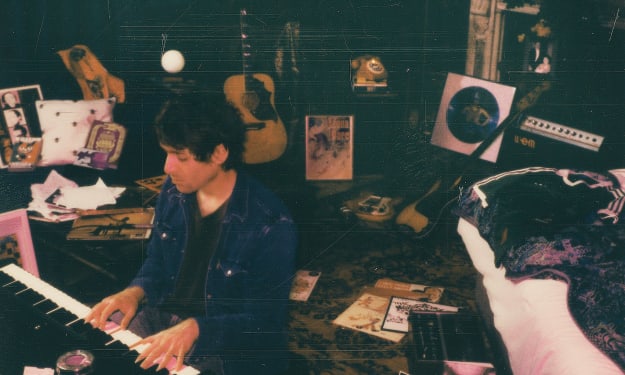An Album You Should Know
Little Steven and the Disciples of Soul — Men Without Women — 1982

Now, everyone is well aware of who Steven Van Zandt (aka Little Steven, Miami Steve Van Zandt) is.
Thanks to his decades-long career in music, serving as rabble-rousing counterpart to Bruce Springsteen’s “The Boss” in The E Street Band, and of course, as Tony Soprano’s consigliere, Silvio Dante’, from HBO’s iconic The Sopranos. He may not be a household name, but he is a recognizable face.
It’s worth noting that Little Steven also:
- Starred, co-wrote, and was the executive producer Lilyhammer. The first original Netflix series produced in collaboration with Norwegian broadcaster NRK. It may not have been Netflix’s first original streaming show, but damn near close as it pre-dates House of Cards.
- Since 2002, he has hosted the syndicated radio program Little Steven’s Underground Garage, a weekly show that celebrates garage rock and similar rock subgenres. The show is heard on over 200 radio stations.
- He has an entertainment company called Renegade Nation, which focuses on artist management, production, live events, and distribution. Renegade Nation is also the parent company to Little Steven’s record label, Wicked Cool Records.
[Fun Fact: Steven Van Zandt is from Massachusetts, not New Jersey…may explain the use of the word “Wicked” in Wicked Cool Records.]
- Van Zandt has a huge CV of production credits. In addition to co-producing Springsteen’s career-defining albums, Little Steven has produced bands like Lone Justice, Southside Johnny and The Asbury Jukes, Arc Angels, Gary U.S. Bonds, Darlene Love, etc.
- AND THEN, there is TeachRock — an educational program founded by Little Steven where teachers (K-12) engage students by using popular music to “create interdisciplinary, culturally responsive education materials for all 21st-century classrooms.” The TeachRock curriculum helps “keep the arts in the DNA of every school system while engaging students and improving academic outcomes.”
Calling Steven Van Zandt a renaissance man is too quaint. So let’s use maverick — because ultimately, that’s what he is.
That’s what we know about him today. But back in 1981/82?
If you were from the tri-state area (NY, NJ, CT) or a die-hard Springsteen fan, you probably knew Van Zandt as the chapeau-wearing whirling dervish guitar player in The E Street Band. I would guess many had no idea that under the hat lived a man with such varied interests and skills.
Since I lived in Ohio, I barely knew who Bruce Springsteen was, let alone anyone from The E Street Band. But ask me the chronological order of every REO Speedwagon album through 1984, and I got you covered (I’m not proud of that btw.)
After moving to New Jersey from Massachusetts Van Zandt began rampaging through the music scene in the late 60s/early 70s. Leading and joining bands, with rock stardom the only thing on the agenda. It was during this time that he formed his bond with Bruce Springsteen after having been in the band Steel Mill and The Bruce Springsteen Band with him.
If you want to know about that bond between Bruce Springsteen and Steven Van Zandt, you can read Springsteen's autobiographical tome’ Born to Run.
If you're limited on time, you can listen to “Bobby Jean” from Born in the U.S.A.
When you’re a maverick like Van Zandt, it has to be a challenge to push pause on your own ambitions to serve the greater good. But that is what Van Zandt did when he moved to E Street full-time for the Born to Run sessions and subsequent tour.
I can only imagine that Van Zandt was restless by the early 80s, after helping propel his friend to the upper echelons of rock and roll by co-producing Born to Run, Darkness on the Edge of Town, and The River — Born in the U.S.A. which launched Springsteen into the stratosphere, was still two years out.
While Springsteen was working on his acoustic solo album Nebraska, Little Steven had kept his musical interests afloat by signing a solo deal with EMI America after being pursued by A&R legend Gary Gersh (Nirvana, Foo Fighters, Soundgarden).
Stepping from the shadow of stage right to the spotlight of center stage is not a decision someone makes lightly. But Van Zandt had fronted bands before, so this wasn’t an alien concept for him.
Initial recording for Men Without Women began in 1981 with his friends in The Asbury Jukes, The E Street Band, and The Miami Horns. But Van Zandt would hit pause to go co-produce and make Born in the U.S.A.
Eventually reconvening in 1982 with drummer Dino Danelli (The Young Rascals) and bass player Jean Beauvoir (The Plasmatics), The Miami Horns, and various studio aces and friends, they began recording again. By now, Van Zandt had christened the band The Disciples of Soul.
To wit: Men Without Women was born.
While they finished recording, they would woodshed the songs around clubs in New York City.
The album is titled after the Ernest Hemingway book of short stories, Men Without Women. Van Zandt’s solo debut is a rock and roll bouillabaisse from a guy with a love and encyclopedic knowledge of the genre.
[Fun Fact: This is where Van Zandt begins using the moniker, Little Steven. Not only to distance himself from The E Street “Miami Steve” but also to pay homage to Little Richard and Little Walter.]
With the steady growth of multi-track recording by the early 80s, recording a band in one room had fallen out of favor. But not for a purist like Steven Van Zandt.
I can’t recall where, but I remember reading that Van Zandt recorded Men Without Women in one room so the band could see one another. He thought this was the best way to capture the essence of his songs and perpetuate the solidarity of a band. It yields very high dividends. By all accounts, there are very few overdubs on the album, too.
The release of Men Without Women happened to coincide with my first trip to New York City, where my grandmother slipped me $20 and told me to “put it in your shoe,” and my cousins baptized me at the altar of Bruce Springsteen and Little Steven.
The first single, “Forever,” was released in October of 1982.
The video for “Forever” has New York City as its mise en scene. We see Jean Beauvoir riding a bike around the city, other Disciples in various states (jogging, yawing), and Little Steven getting flowers before going to his girlfriend's place. Evidently, everyone is on their way to band practice, ergo the mix of narrative and performance. Trust me, in 1982; this was high art.
And in a testament to both the song and the video, it holds up well. Of course, New York City is much different now, but the spirit of the video and song remains.
It’s a simple, mid-tempo straightforward love song:
I learned when I was a young boy You turn your cheek you get slapped I take the punches I can’t slip And I give it right back Even if I win girl, you know it really won’t mean too much What I want baby most of all is the only thing I can’t touch
If I give you my heart would you love me forever Would you pick up the pieces if I stumble and fall If my world falls apart could you keep it together If I can’t have you I don’t want no one at all
Just because I’m so quiet Just because I don’t cry The hardest lesson to learn girl Is how to take it inside
Unfortunately, the song's excellent blend of jangly guitars and horns was not popular in October of 1982.
Back when these things still meant something, the single peaked at #63 on the Billboard singles chart and Men Without Women only made it to #163 on Billboards Top 200 albums.
Despite the album being recorded in two separate chunks, first in ’81 and then completed in ’82, Men Without Women has a consistent production sound throughout. This only makes sense because all the songs were written by Van Zandt and the album was produced by him.
It can come off a little “tinny,” a little like AM radio. And I believe that was intentional. He would employ an updated version of that sound in the mid-80s when he produced Lone Justice and Arc Angels (and probably others, but I am most familiar with those two).
But the thing is, you either like that sound, or you don’t. I happen to like it …when it’s done well. It’s done very well here on Men Without Women.
No one can say that Gersh and EMI America didn’t try to make the album a hit. They worked it. Even despite the failure of the first single, “Forever,” somehow the label squeezed half the album (five songs) out as singles:
- “Forever”
- “I’ve Been Waiting”
- “Under the Gun”
- “Save Me”
- “Lyin in a Bed of Fire”
Those are all fantastic songs, but none of them resonated with a broad audience.
It should be noted that, much like the album's production sound, Little Steven has a very distinct voice: you either like it or you don’t. I do.
It would seem much of America did not.
Surprisingly, my favorite song, “Angel Eyes,” was never a single. The song, almost 40 years old now, still gives me goosebumps. For me, “Angel Eyes” captures everything (sound, voice, tone) that the album was shooting for.
She sits by her window I watch her there She makes me coffee, she combs her hair Her eyes are shining she’s gone I know She’s on a stage in a palace so long ago Ain’t it a shame, money can’t buy what she sees She’s got the heart of a child, bless my soul Precious as diamonds, silver and gold
When I look into your angel eyes You got me baby I realize I ain’t never gonna make you cry Ooh, you angel eyes
I can only guess that the song wasn’t released as a single because a very good friend of his sang back-up on it.
As a kid in Ohio, Men Without Women would be my lifeline to New York City until I could get there myself (five years later). This meant that my midwestern roots had me completely flummoxed by the song “Princess of Little Italy.” Simply put, I didn’t like it.
That said, years later when I dated an Italian woman from Brooklyn, I came to appreciate the song a lot more. Still not my favorite, but I get it.
If a band member steps out and does a solo thing, that can sometimes cause bad blood in a band. The deep-rooted friendship between Springsteen and Van Zandt wasn’t compromised at all. The Boss shows up (uncredited), providing backing vocals on the aforementioned “Angel Eyes,” as well as “Men Without Women,” but most noticeably on “Until the Good Is Gone.”
Little Steven would stay in The E Street Band long enough to record and co-produce Born in the U.S.A. before fully embracing his solo career (returning to E Street in ’99.)
Along with the self-titled debuts of Broken Homes and Lone Justice, Little Steven and the Disciples of Soul’s Men Without Women holds the unique distinction of having been an album I have purchased repeatedly across various platforms over the years. And much like the other two, it remains firmly ensconced on my Desert Island Top Ten.
Some may argue that this album is from its era, but only because it was recorded in 1981/82. However, like the music that Little Steven champions, Little Steven and the Disciples of Soul’s Men Without Women transcends that era. That’s always what good music does.
The album, Men Without Women, like its literary counterpart Ernest Hemingway’s book of short stories, highlights the work of two men who embody the spirit of a true maverick; making them timeless.
About the Creator
Keith R. Higgons
Writer living in Connecticut.






Comments
There are no comments for this story
Be the first to respond and start the conversation.